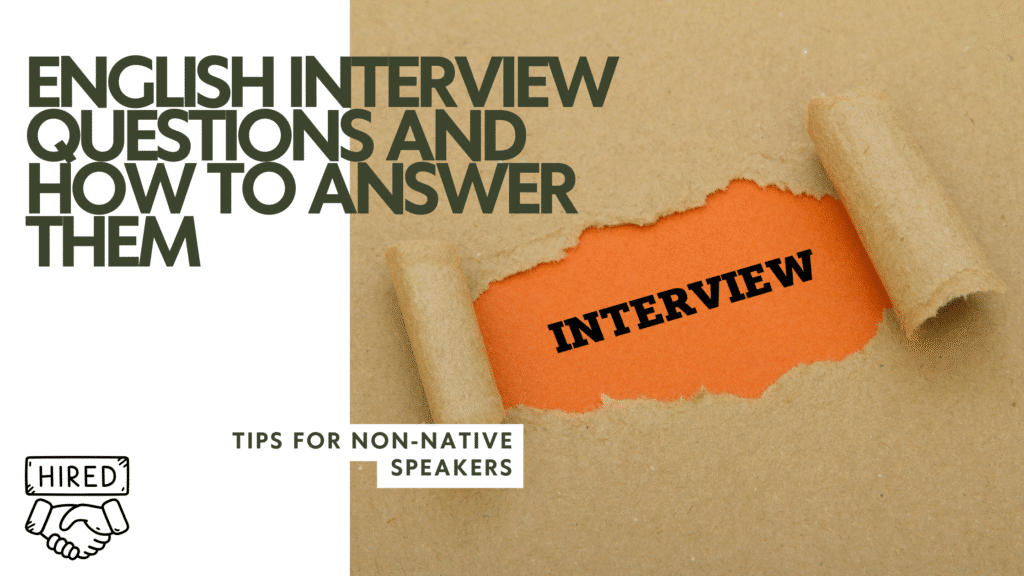Job interviews in English can feel daunting, particularly when English isn’t your first language. The English interview process stands out as the toughest part of any job application. Non-native speakers face an extra layer of stress during these already nerve-wracking experiences.
English proficiency gives you a clear edge over candidates who speak just one language. English ranks as the most accessible language worldwide and serves as the primary medium for business communications. Your job search will expose you to interview questions that assess both your qualifications and communication skills.
You don’t need perfect English mastery to ace your job interview. Interviewers care most about understanding your responses clearly. The right preparation and practice will help you handle English interview questions with confidence while highlighting your expertise and background.
This piece shows you how to tackle common interview questions in English. You’ll learn effective response strategies and practical confidence-boosting tips as a non-native speaker.
Types of English Interview Questions You Might Face
Preparing for an english interview means you need to know what questions might come your way. Companies create questions that help them assess your language skills, qualifications, and cultural fit. Here’s a look at the questions you should be ready to answer.
General questions to break the ice
Most interviewers start with easy questions to help you feel relaxed. These “icebreaker” questions create a comfortable environment and give them a peek into your personality and communication style. They might ask about your trip to the interview, your hobbies, or what you know about their company. For example:
- “Can you tell me about yourself?”
- “What’s your morning routine like?”
- “Have you watched any good shows lately?”
- “How was your journey here today?”
These casual questions do more than just calm your nerves. They show how well you speak without preparation and reveal parts of your personality that your resume doesn’t capture.
Experience and background-related questions
The conversation usually moves to questions about your work history and education after the ice is broken. These questions help explore your qualifications and skills that make you right for the job.
“When answering these questions, mention any special certifications, coursework and training you have received and any academic accomplishments relevant to the position you are applying for,” advises career experts. You should prepare brief answers about your previous roles, key achievements, and skills that match what they need.
Behavioral and situational questions
Behavioral questions look at your past experiences while situational ones present what-if scenarios. Both help assess how you handle real-life challenges. You’ll often hear questions starting with “Tell me about a time when…” or “How would you handle…”
“Because every industry and job role has a unique set of challenges and opportunities, employers assess how well candidates are prepared to manage these circumstances before they make a hiring decision,” note employment specialists.
The STAR method (Situation, Task, Action, Result) helps structure your answers clearly.
Role-specific and technical questions
Specialized positions need questions that test your job-specific knowledge. “Technical interviews usually begin in the same way any other interview would: with a series of general and behavioral interview questions intended to learn more about who the candidate is and how they will fit in with the culture of the company,” explains industry experts.
Questions range from basic field knowledge to specific technical challenges. Some interviews might include practical tests to check your problem-solving abilities.
Questions about your goals and motivation
Companies want to know your career plans and what drives you. Your answers about future goals help them see if you’ll grow with them and stay committed.
“Understanding a candidate’s career goals is pivotal for long-term retention and ensuring mutual growth. It helps in aligning company objectives with employee aspirations, fostering a motivated and committed workforce,” according to hiring professionals. Link your goals to the job and company’s mission to show your genuine interest.
Your confidence will grow when you understand these different types of english interview questions. This knowledge helps you prepare better for your job interview in english.
How to Answer English Interview Questions Effectively

Image Source: British Council
Answering english interview questions needs more than just language skills – it needs strategy. These techniques will help you showcase your qualifications and create a great impression, regardless of your English level.
Use the STAR method for behavioral questions
The STAR method gives you a simple way to answer behavioral questions that start with “Tell me about a time when…” or “Describe a situation where…”. This approach helps you tell a compelling story that flows naturally.
STAR stands for:
- Situation: Briefly describe the context (spend about 20% of your answer here)
- Task: Explain your responsibility or goal (about 10%)
- Action: Detail the specific steps you took (about 60%)
- Result: Share the positive outcomes, using measurable results when possible (about 10%)
This structure lets you focus on your actions while giving just enough background. “The STAR method is meant to be simple,” advises career experts, “Sometimes people provide too much detail and their answers are too long. Focus on just one or two sentences for each letter of the acronym.”
Keep answers clear and structured
A well-laid-out answer shows clear thinking and helps interviewers follow along easily. You can use a simple three-part format for non-behavioral questions:
- Opening: Start with a direct answer to the question
- Middle: Provide 2-3 supporting details or examples
- Closing: Summarize your main point and signal you’ve finished
The best way to structure your answer is to spend 10% on background, 80% on explaining actions, and 10% on results.
Avoid memorized responses—sound natural
Learning answers word-for-word can backfire in job interviews in english. You might sound robotic and struggle if the interviewer changes the question. The better approach is to prepare ideas rather than scripts.
“When you sound natural in English, you create trust,” explain language experts. Think about how you’d answer in your native language, then translate the concept—not every word. You can build flexibility by practicing different versions of the same answer.
Taking a moment to gather your thoughts during the interview is fine. These brief pauses can make you appear more thoughtful and authentic.
Tailor your answers to the job description
Your chances of success go up substantially when you match your responses to the job requirements. “Many candidates provide excellent examples of their work but miss connecting their experiences to the specific requirements of the role,” report hiring managers.
The best way to customize your answers:
- Review the job description before your interview
- Highlight key skills and responsibilities in the posting
- Connect your experiences directly to these requirements
- Emphasize relevant achievements that match what they’re seeking
This approach shows you understand the position and demonstrates how your qualifications match their needs perfectly. For english interview questions and answers, making your answers relevant matters just as much as speaking good English.
Sample English Interview Questions and Answers
Image Source: YouTube
Answering english interview questions successfully needs you to understand what interviewers want and create compelling responses. Here are five questions you’ll likely face, along with sample answers to help you prepare.
Tell me about yourself
Most english interviews start with this question. Your first impression matters here. The best approach includes a quick overview of your work history, your relevant achievements, and why this role interests you. You can structure your answer using present-past-future or past-present-future format to keep it clear.
Professional details should take center stage in your two-minute response. Your personal life can wait. To name just one example: “My career started in retail management. I made the move to healthcare administration four years ago. My team’s communication improved by 20% after I implemented new systems. Regular staff meetings help me stay connected with their needs. I’m excited to bring these skills to your organization.”
What are your strengths and weaknesses?
This question reveals your self-awareness and truthfulness. Pick a strength that matches the job requirements. Back it up with a specific example and show its results.
Your weakness should be real but not crucial to the role. Show how you’re working to improve it. Skip overused answers like “I’m a perfectionist” unless you can prove it with a genuine story of growth. Remember, employers want to see if you can own your shortcomings and whether your abilities complement their team.
Why do you want to work here?
Employers ask this to check if you know their company and if your goals match the position. Show what value you’ll add rather than what benefits you seek. Study their website, learn about their offerings, and link your abilities to their requirements.
A solid answer could start: “I see a chance to help a progressive company grow, and my skills match perfectly with this role because…”
Describe a challenge you overcame
The STAR method works best here – Situation, Task, Action, Result. Set the scene, explain the challenge, describe your solution, and showcase the positive outcome.
Employers learn about your resilience, creativity, and problem-solving skills from this answer. Choose a story with a positive ending that shows these qualities.
Where do you see yourself in 5 years?
Your answer shows if your expectations fit the role and hints at your commitment level. Show drive while explaining how this position helps your career growth.
Talk about your eagerness to learn in the role and discuss realistic advancement opportunities within the company. Steer clear of unclear answers or plans that suggest leaving the organization.
Improving Your English for Job Interviews
Success in an english interview depends on good preparation. Your message matters as much as your delivery. Here are practical ways to boost your English communication skills for interviews.
Practice with mock interviews
Mock interviews are a great way to get ready, especially for non-native speakers. You might feel ready for your job interview in english, but practice interviews beforehand can show where you need to improve.
You can role-play different scenarios with English-speaking friends, language partners, or professional learning schools like BumbleB English to build your fluency and adaptability.
Record and review your answers
Recording yourself is one of the best ways to improve, yet many people skip this step. This helps you:
- Spot when you use fillers like “uh” and “umm”
- Check your pronunciation, grammar, and delivery
- See how confident and clear you sound
Yes, it is true that recording yourself might feel uncomfortable at first, but this method works well for improvement. Writing your answers before speaking them helps you understand how they flow and where you need adjustments.
Work on pronunciation and fluency
Speaking clearly is vital during interviews. A slower, clearer pace gives you thinking time and shows confidence. Pay attention to how emphasis changes word meaning.
Try the shadowing technique – repeat what native speakers say in videos or podcasts to learn proper pronunciation and tone. Knowing how to move your tongue, lips, and mouth for different sounds helps you pronounce English correctly.
Expand your job-related vocabulary
A strong vocabulary in your industry builds confidence and credibility. Focus on:
- Industry-specific jargon and technical terms
- Common interview phrases (like “leading by example”)
- Strong words to highlight your achievements
Learn 5-10 related words each week about topics like leadership or project management to build your professional vocabulary step by step.
Tips to Build Confidence and Make a Good Impression

Image Source: Boulo Solutions
Your personality and presentation matter just as much as knowing english interview questions and answers. These practical strategies will help you make a great impression at any job interview in english.
Slow down and speak clearly
The way you pace your speech affects how interviewers see you. Speaking too fast shows nervousness, while going too slow might make you seem unsure. Find a comfortable middle ground that lets you state your thoughts clearly. Clear speech becomes vital during an english interview to avoid any mix-ups. Take a deep breath before you answer – it helps you stay calm and improves your fluency. This approach shows you listen actively and give better answers.
Use positive body language
Your actions speak louder than words – body language makes up 55% of how others see you. Keep good posture with relaxed shoulders during your interview questions and answers in english to show confidence and attention. Look people in the eye naturally to build trust and show you’re involved. The interviewer will notice when you lean slightly forward as they speak. Start strong with a firm handshake and eye contact when you meet.
Dress appropriately for the role
Check out the company’s dress code ahead of time. The smart move is to dress a bit more professionally than needed, even in casual workplaces. Pick well-fitted clothes in neutral shades like black, navy, or brown that you can move around in. Get your outfit ready the night before your english for job interview. This helps you spot any issues like wrinkles, stains, or tears early.
Prepare questions to ask the interviewer
Research the company really well and practice talking about them in English. Smart questions about the job and organization show real interest. Empty responses like “no questions” make you look unprepared. Your questions should reflect what you learned during the conversation.
Conclusion
A job interview in English definitely brings unique challenges for non-native speakers. But with good preparation and practice, you can turn this challenge into a chance to show your qualifications and adaptability.
In this piece, we looked at everything in English interview preparation. Understanding different types of questions—from icebreakers to technical ones—helps you know what’s coming. The STAR method is a great way to structure compelling responses to behavioral questions and keep your answers clear and relevant.
Practice makes perfect when you prepare for English interviews. Mock interviews, self-recording, and building your job-related vocabulary boost your confidence by a lot. On top of that, it helps to mind your body language, dress well, and control your speaking pace to create a good impression.
Take this knowledge, practice hard, and walk into your next interview confident. Your dream job awaits—don’t let language barriers stop you.



